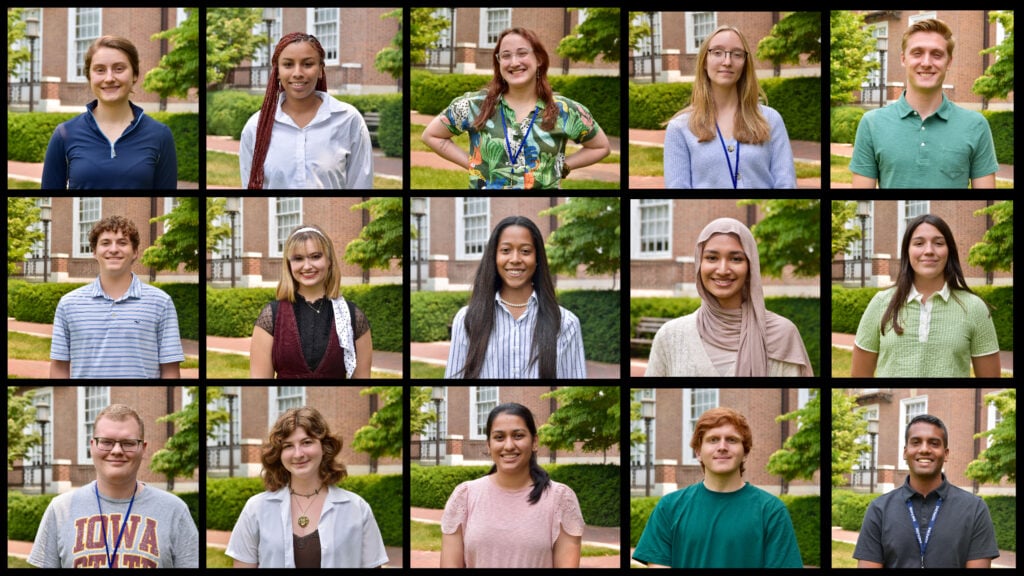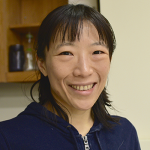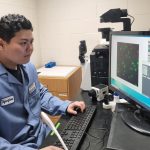Meet our Summer 2023 Undergraduate Student Researchers

Above photo. Top row from left to right: Annabelle Hendrickson, Demetria Labat, Erin Hurley, Sarah Greshham, and Tyler Bartolome. Middle row from left to right: Justin Furgata, Kailee Parrot, Mikhaila Doyle, Simra Khan, and Viviana Velez Aviles. Bottom row from left to right: Nick Herbst, Olivia Barbieri, Roshni Patel, Thomas-Shadi Voges, and Will Dhana.
Every summer for 13 years, the INBT welcomes undergraduate students in the Nanotechnology for Biology and Bioengineering Research Experience for Undergraduates (REU) program. Students spend 10-weeks with INBT faculty and mentors heavily engaged in research projects ranging from developing cancer therapies and diagnostic tools to using regenerative engineering to heal the body. They also participate in professional development training, networking activities, and explore Baltimore and other surrounding cities.
Meet our student researchers, learn about their projects, and follow them on social media.
Home University: Smith College, Northampton, Massachusetts
INBT Faculty Mentor: Jude Phillip, assistant professor of biomedical engineering
INBT Graduate Student Mentor: Yoseph Dance
Research Project: Annabelle is investigating immune microenvironments in aging lymphoma models using 3D cell culture and computational approaches to help develop enhanced therapeutics.
Social media: Follow Annabelle on LinkedIn.
No words can fully describe how grateful I am for the INBT opportunity and my mentors. Witnessing and being a part of cutting edge research that leads to new scientific insights and improved therapeutics is deeply inspiring.
Home University: Jackson State University, Jackson, Mississippi
INBT Faculty Mentor: Honggang Cui, professor of chemical and biomolecular engineering
INBT Graduate Student Mentor: Tian Xu
Research Project: Demetria is developing peptide-drug conjugates that are used for the overall study of combining chemotherapy and immunotherapy. Understanding how this works and finding a way to control the drug release could help in treating brain cancer.
Social media: Follow Demetria on LinkedIn
I hope to gain insight on the fundamentals of research. I would like to use those and the techniques I learn and apply them to a project I am passionate about in the future.
Home University: St. Mary’s College of Maryland, St. Mary’s City, Maryland
INBT Faculty Mentor: Xiaobo Mao, associate professor of neurology
INBT Graduate Student Mentor: Ramhari Kumbhar
Research Project: Erin is trying to identify the protein players responsible for mutating key residues of alpha-synuclein, the protein that, when aggregated, causes Parkinson’s disease and associated disorders. When alpha-synuclein mutates, it more apt to join with another mutated protein to create neurotoxic formations known as Lewy bodies. By determining the mechanism of these mutations, future research could look into drugs targeting the identified proteins.
Social media: Follow Erin on LinkedIn.
I hope to improve my research methods as well as create lifelong connections in order to elevate me to my future goals.
Home University: College of William and Mary, Williamsburg, Virginia
INBT Faculty Mentor: Jochen Mueller, assistant professor of civil and systems engineering
INBT Graduate Student Mentor: Sarah Propst
Research Project: Sarah is working with micro-scale direct ink writing nozzles to determine ink compatibility and deformation, and designing novel ink mixing or ink switching nozzles. Direct ink writing is a method of 3D printing and is advancing in many areas, including biological testing, improved synthetic implants, microfluidics, electronics, and 3D printing at the micro scale, which opens new possibilities in the biological and technological worlds.
Social media: Follow Sarah on LinkedIn.
I hope to learn many new skills and interesting ways of looking at things while applying my chemistry background to a very unique engineering lab.
Home University: Drake University, Des Moines, Iowa
INBT Faculty Mentor: Robert Ivkov, assistant professor of radiation oncology and molecular radiation sciences and oncology
INBT Graduate Student Mentor: Hayden Carlton
Research Project: Tyler is testing the heat tolerance of different kinds of cancer cells to inform models for heat-based cancer therapy. When physicians can better understand how heat will affect the survival of different kinds of cancer cells, cancer treatment can be better individualized for each patient.
Social media: Follow Tyler on LinkedIn.
I hope to learn about high-level academic and medical research and gain experience working with diverse and multi-disciplinary research groups.
Home University: Clemson University, Clemson, South Carolina
INBT Faculty Mentor: Hai-Quan Mao, professor of materials science and engineering
INBT Graduate Student Mentor: Jiayuan (Jarvis) Kong
Research Project: Justin is creating a bio-stimulatory nanofiber-hydrogel composite using electrospun fibers and hyaluronic acid hydrogels. The goal is to use the hydrogel to encourage soft tissue regeneration/remodeling and adipocyte formation in sub-dermal space instead of scar tissue formation in damaged tissues.
Social media: Follow Justin on LinkedIn.
During my 10 weeks at the INBT REU I hope to gain relevant knowledge of biomedical engineering principles and lab techniques. I want to be able to do research on life-changing topics that can help improve our society and medical knowledge.
Home University: University of Washington, Seattle, Washington
INBT Faculty Mentor: Xiaobo Mao, associate professor of neurology
INBT Graduate Student Mentor: Ning Wang
Research Project: Kailee is screening and identifying 23 possible sLAG-3 receptors to determine their role in the transmission and accumulation of α-synuclein in various neural cells. By identifying sLAG-3 receptors, researchers can create targeted therapies to decrease α-synuclein aggregation, which can ultimately decrease motor and non-motor symptom progression in Parkinson’s disease.
Social media: Follow Kailee on LinkedIn.
I am hoping to expand my laboratory knowledge and skills all while working alongside some of the best and brightest in the field!
Home University: Brown University, Providence, Rhode Island
INBT Faculty Mentor: Stavroula Sofou, professor of chemical and biomolecular engineering
INBT Graduate Student Mentor: Rajiv Ranjit Nair
Research Project: Triple negative breast cancer (TNBC), a rare form of breast cancer, is particularly difficult to treat and is more likely to metastasize compared to non-TNBC forms. Mikhaila is optimizing the drug administration scheme to hypoxia reporter MDA-MB-231 and BT-474 cell lines, isolated from breast carcinoma. Understanding how chemotherapy concentration and time of drug exposure impact 3D spheroidal cell growth can help minimize TNBC tumor metastasis and promote patient survival.
Social media: Follow Mikhaila on LinkedIn
I look forward to conducting forefront biomedical research under the instruction of Dr. Sofou, where I’ll advance my laboratory techniques and help bridge innovation with impact. I’m grateful for this program which encourages researchers to seek out knowledge, collaborate with others, and focus on the greater purpose of their work.
Home University: Long Island University, Brookville, New York
INBT Faculty Mentor: Honggang Cui, professor of chemical and biomolecular engineering
INBT Graduate Student Mentor: Myriell Kim
Research Project: Simra’s research will focus on protein purification techniques combined with the identification of antibodies that bind specifically to a peptide sequence. By employing techniques that use amino fibers and affinity-based methods, we aim to isolate and purify target proteins efficiently from cell culture effluent.
Social media: Follow Simra on LinkedIn.
I am eager to acquire hands-on expertise in the field’s state-of-the-art equipment and gain valuable insights into the design and fabrication of nanoscale devices for biomedical applications. I hope to grow comfortable in an environment that constantly challenges my thinking, and I am excited to foster a supportive network that encourages both personal and professional growth.
Home University: University of Puerto Rico at Mayagüez, Mayagüez, Puerto Rico
INBT Faculty Mentor: Jude Phillip, assistant professor of biomedical engineering
INBT Graduate Student Mentor: Nico Macaluso
Research Project: Viviana is studying how different methods of senescence in T-cells cause different biophysical characteristics and morphologies. This research is importance as it helps improve our understanding of biological aging dynamics and we can potentially target ways to promote healthy aging.
Social media: Follow Viviana on LinkedIn
I hope to develop both technical and soft skills to use throughout my career and use such skills to contribute in the fascinating research being conducted in the nanobiotechnology field.
Home University: University of Wisconsin-Madison, Madison, Wisconsin
INBT Faculty Mentor: Sangmoo Jeong, assistant professor of chemical and biomolecular engineering
INBT Graduate Student Mentor: Rodger Black
Research Project: Nick is using hydrogels of varying stiffnesses to investigate how a cell’s mechanical environment affects its metabolic responses. This research can be used to model fibrosis in diseases such as cancer and identify therapeutic targets along the cell’s metabolic pathways.
Social media: Follow Nick on LinkedIn
I hope to learn critical lab skills that I can utilize as I pursue a career in research.
Home University: Barnard College, New York, New York
INBT Faculty Mentor: Denis Wirtz, professor of chemical and biomolecular engineering and vice provost for research at Johns Hopkins
INBT Graduate Student Mentor: André Forjaz
Research Project: Olivia is creating a three-dimensional map of a brainstem sample using deep learning AI technology. She is scanning individual slices, annotating them for notable structures, and compiling the individual scans into one image. This three-dimensional pathology research makes it more efficient to analyze delicate and complex structures of tissue microenvironments to understand the impacts of disease at the cellular level.
Social media: Follow Olivia on LinkedIn.
I am so grateful to have the opportunity to work in Dr. Wirtz’s Lab, immerse myself in the field of nanobiotechnology, foster a new set of research skills and incredible connections within INBT, and explore the music and food scene of Baltimore. Overall, I hope to make a summer of lasting memories, both inside and outside of the lab!
Home University: Hofstra University, Hempstead, New York
INBT Faculty Mentor: Kalina Hristova, professor of materials science and engineering
INBT Graduate Student Mentor: Mahmoud Abouelkheir
Research Project: Roshni is studying two specific receptor tyrosine kinases (RTKs), EGFR and EphA2, which, when over expressed, have been associated with increased mortality rates in cancer patients. By better understanding RTK interactions, researchers can development novel therapeutics.
Social media: Follow Roshni on LinkedIn.
I’m truly grateful for the opportunity to conduct innovative and groundbreaking research in the lab of Dr. Kalina Hristova at Johns Hopkins University this summer. I look forward to expanding my research skills and knowledge while also fostering meaningful connections within the INBT program. Beyond the lab, I’m excited to explore the city of Baltimore, getting to know its rich history and vibrant culture.
Home University: North Central College, Naperville, Illinois
INBT Faculty Mentor: Robert Ivkov, assistant professor of radiation oncology and molecular radiation sciences and oncology
INBT Graduate Student Mentor: Preethi Korangath
Research Project: Thomas is testing the sensitivity of different cancer cell lines to various levels of heat. Understanding how cancer cells react to heat can help predict their behavior in animal models, where the Ivkov lab uses iron oxide nano particles and magnetic fields to selectively apply heat to tumors.
Social media: Follow Thomas on LinkedIn
I’m excited to gain new research experience, work in an interdisciplinary team, and learn more about the field of cancer research.
Home University: Florida State University, Tallahassee, Florida
INBT Faculty Mentor: Denis Wirtz, professor of chemical and biomolecular engineering and vice provost for research at Johns Hopkins
INBT Graduate Student Mentor: Lucie Dequiedt
Research Project: Will is using the novel CODA technology to create high-resolution, three dimensional reconstructions of fetal macaque kidneys. Studying the structural components of an organ at the cellular level will help to develop our understanding of how diseases spread and lead to better treatment.
Social media: Follow Will on LinkedIn
I hope to be able to extrapolate understanding of neural networks and computation, and its intersection with biotechnology. Together, the possibilities of what nanobiotechnology can achieve are unlimited.





